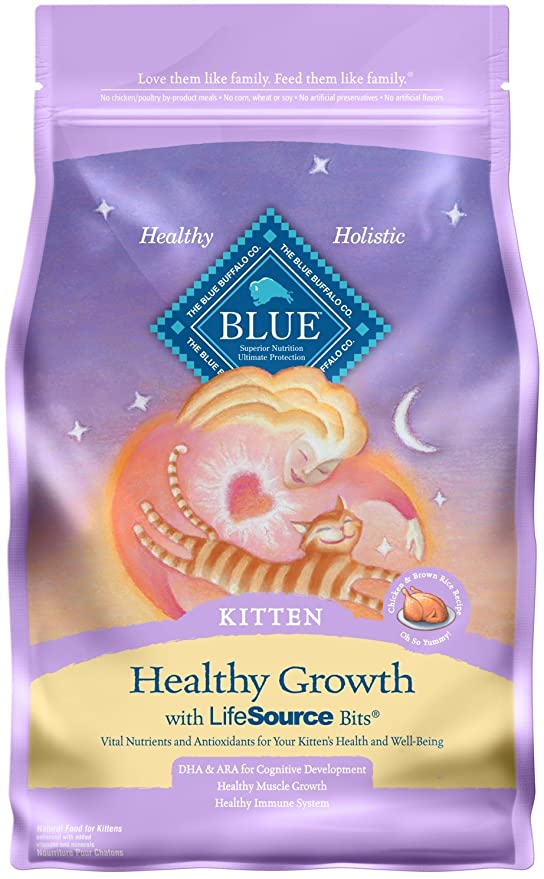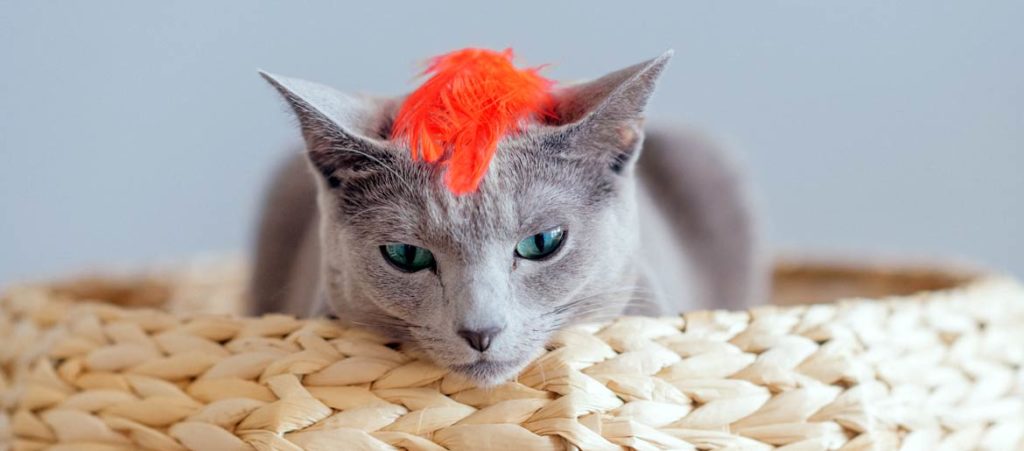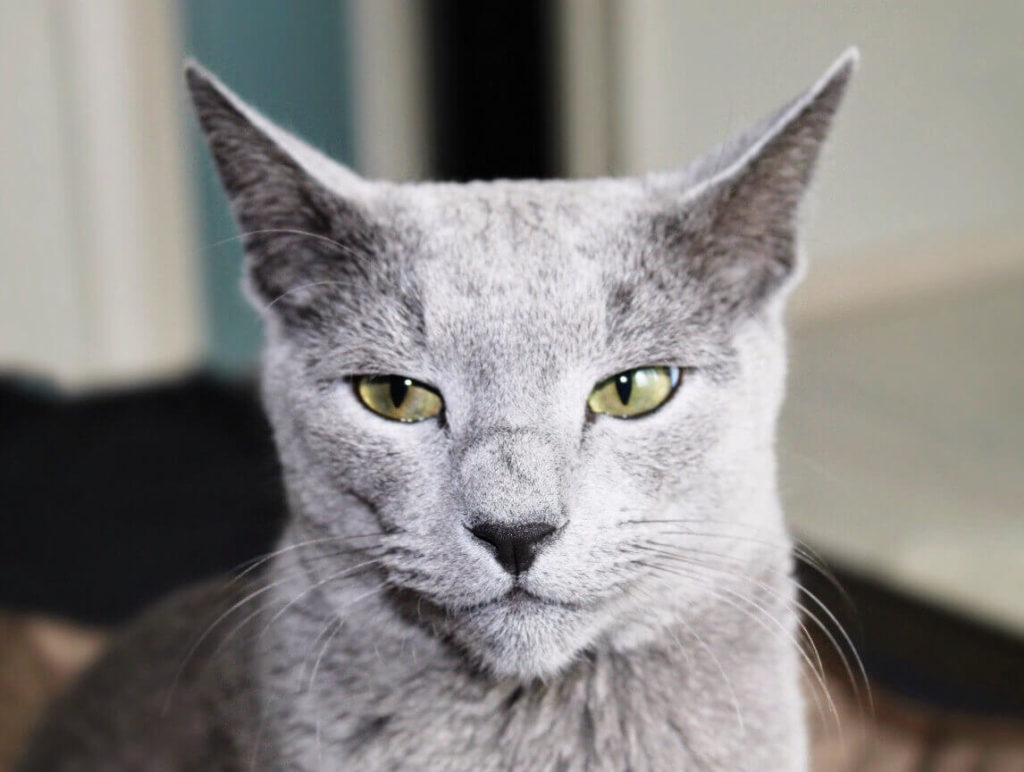Comparatively speaking, kittens need a lot more care than adult cats. If you are thinking of bringing a Russian blue kitten home, then there are quite a few important things you should know. Feeding the best type of food to your kitten is certainly one of the salient things you should know as a cat parent. And, like all the kittens your Russian blue kitten is not an exception.
Like any other kittens, the Russian blue kittens will be very energetic and will show a fast-paced growth rate. To support their growth and their hyperactivity, they need the necessary proteins, fats, and nutrients in their diet. So, it is extremely important to provide them with the best available kitten food that fulfills their nutritional needs.
In this article, I am going to talk about the best food for Your Russian Blue Kitten. Besides, I will also give some additional information that will help you raise your cute friend properly.
What Do Russian Blue Kittens Need In Their Food?
Before talking about the best food for a Russian blue kitten, you must first know about the various nutritional contents that make the food best. A growing kitten needs the following nutritional contents in its food.
Protein
Proteins are the building blocks of all the organ’s muscles and tissue. It plays a vital role in determining the health and body structure of any living being.
As for a growing kitten, specifically a Russian blue kitten, they require a high amount of protein during the weaning stage, but thereafter their protein needs start to decrease.
Your Kitten should be gett about 30-50% of protein on a dry matter basis for their healthy growth. Because your kitten gains about 30% of energy from proteins in their diet. Furthermore, the protein in their food breaks down into key components like amino acids. The amino acid is absorbed by the kitten’s body and further creates new proteins and intensifies other bodily processes.
As a result, while choosing the food for your Russian blue kitten you should properly analyze the standard protein content in the food’s label. Moreover, many available cat foods for adult cats can contain nutritional contents with similar protein levels, but other nutrient contents may not be appropriate for kittens.
Fat
Your first impression regarding fat certainly won’t be of high regard, right? Well, a high amount of fat certainly is not good for anybody. But, in truth fat plays a major role in the body of any living organism.
Fat provides much-needed bodily insulation, protects the internal organs, and provides energy to the body. It is also the source of essential fatty acids that provides energy and carries fat-soluble vitamins.
Similarly, your Russian Blue kittens need fat in their food because fat contains Linoleic and arachidonic acid. The mentioned fatty acids help for kidney functions and prevent inflammatory diseases.
As I already mentioned, excessive fat is not good for anybody, and a kitten is not an exception. The excessive fat results in excessive energy, which further results in obesity and orthopedic diseases. Due to this, the recommended amount of fat your Russian blue kitten should be getting from its food is in the range of 18-35% on a dry matter basis.
So, make sure the kitten food you are providing your Russian blue kitten fulfills the standard.
Calcium
A kitten’s food requires about 0.8-1.6% of calcium. Kittens grow fast in a short period, due to which calcium is necessary for the development of their bones and teeth.
There are many foods available for both homemade and commercial nature. But, homemade food may, may not contain or even contain an overload of the needed levels of calcium. So, consulting a vet is recommended.
Remember lower calcium than the standard is not good but over a top amount of calcium is not good for your kitten as it can cause hyperparathyroidism.
Carbohydrate
Carbohydrates provide an important role in the health and development of your kitten’s intestines. It also provides energy to the developing body tissues and ensuring a healthy body and physiology of your cute kitten.
Furthermore, there is no minimum requirement for carbohydrates for your Russian blue kitten. But, fiber is a type of carbohydrate that is not considered good for growing kittens in high amounts. The required amount of fiber in the kitten food for any kitten is about 3-5%. The standard percentage of fiber content in their food helps the kitten to avoid health problems like chronic diarrhea.
Other Nutrients
Along with the above nutrients, various other nutrients are important and required in the food of your Kitten. Nutrients like vitamin A, vitamin D, vitamin B3, minerals like sodium, phosphorus, Omega 3+6, etc are essential for the normal metabolic functioning of your Russian blue kitten. Some of these minerals are not synthesized by their body itself, so they need vitamins and minerals from the external source including in the food they are given.
How To Know If Your Selection Of Food For Your Russian Blue Kitten Is Good?
Well, the easiest way to know if the kitten food is any good for your Russian blue kitten is by checking the label at the back of the food package. The label in the food container should consist of the following information:
- “Meets the nutritional requirements for kittens established by AAFCO”
- “Complete and balanced nutrition for kittens based on AAFCO feeding trials“
American Association For Feed Control (AAFCO) is a group of federal, local, and state agencies that supervises the union’s pet foods, A stamp of their approval can be your factor of assurance that the food you are going to give to your furry friend is of quality and fulfills the standards of all the contents.
Another way is to carefully analyze the content information on the labels and then make our decision. But, this process needs you to be very informative about the nutritional need of your Russian blue Kitten.
Lastly, you can always buy the kitten food from a well known and trusted company. But, I recommend going with the first option of checking the label of AAFCO approval.
How Does The Nutritional Need Of Your Russian Blue Kittens Differ From The Adults?
Kittens including your Russian blue kitten can show explosive growth in a matter of few weeks. Their weight can double or even triple during this time frame. In addition, they are very playful and require more energy than the adult cat.
Due to this high-end energy requirement, the kittens need more nutrients and calories from their food.
In general, kittens need fat, fatty acid, and vitamins of the same amount as that of adult cats. But, the nutritional need of a Russian blue kitten or any other kitten mainly differs from the adult cats on protein, calorie, and minerals. Because to satisfy their activeness and to enhance their natural process of growth they need protein, amino acid, and minerals in higher amounts than the adult cats.
Hence, I recommend you to feed a kitten based food to your pet rather than an all-age purpose food for cats as the feeding test may not support the label.
What Type Of Commercial Foods Can You Feed Your Russian Blue Kitten?
The nature of Kitten foods like the food for adult cats can be categorized into the following two types:
Dry Food
Dry Foods for cats and kittens alike are convenient and affordable. They are suitable for free-feeding and can be left for a long period of time. Often your kitten will not immediately eat their food, so the food can be left untouched for some time. Due to which, dry foods are ideal in this situation because it does not start smelling with less to no moisture in the food.
Dry food is also beneficial for the oral health of your kitten, as munching on them satisfy tooth itch in their upcoming teeth. In addition, eating dry food has fewer chances of forming plaque in the kitten’s teeth. But, again dry food might not be very compatible with very small kittens because their teeth will be too small to have a munch on dry food.
Moreover, Dry food has been observed to have higher energy density than wet foods. Hence, providing the needed energy for your Russian Blue kitten’s high energy-consuming activeness. But, you will need to carefully supervise the volume of food you are providing your kitten as overeating will result in having an overweight problem.
Wet Food
Wet foods for the kittens and cats are very similar to the natural food of the cats in moisture. The wet foods have about 60% moisture content in them.
Moreover, due to the moisture in the food, wet foods help to decrease the risk of dehydration in your Russian blue kitten and also helps to keep their kidneys and livers healthy.
As I have already mentioned that the weight of the kittens can dramatically increase in a short period, it is important to manage their weight properly. Wet foods can help you manage your weight, as they do not have high-calorie density like dry food. Approximately, wet foods have 0.8-1.5 kcal/g, whereas dry food has 3-4 kcal/g. Hence, not requiring your supervision to manage your kitten’s weight.
What Are the Best Normal Foods For Your Russian Blue Kitten?
Apart from the commercial kitten food, you can also feed your pet baby some normal foods. These foods are also capable of having a positive impact on their growth and health but require your specific supervision regarding the volume of the food.
Cooked Eggs
Eggs have always been one of the mainstream sources of nutrition as it contains vitamin A, C, sodium, proteins, etc. So Whenever you are having a breakfast of eggs, you can give some without adding the salt to your kitten.
Salad Greens
Some lettuce, boiled cauliflower, or broccoli can be feed to your kitten. As we all know cats are primarily carnivores and require meat in their diet. But, the occasional greens will not do any harm. In addition, green veggies contain necessary minerals, fibers, and vitamins, which are beneficial for the health of your kitten.
Cooked Fish Meat
Cat or kitten food often contains fish meat in them, so it is not a surprise to see fish on this list. Fish meat is filled with omega-3 fatty acids, vitamin D, and vitamin B2 which are important for your growing furry baby.
So, giving your Russian Blue Kitten some cooked pieces of fish to munch on is acceptable, plus the cat will much appreciate the gesture of love.
Cooked Meats
You are free to give small shreds or pieces of cooked meat like chicken, lamb, beef, turkey. But, you should avoid giving the greasy part of the meat or any meat product containing additives like a hotdog, jerky, bacon, etc. The greasy and added preservative meats can lead the kitten to face problems of overweight, unbalanced digestion, or even diarrhea.
Cat grass
The wheat and oat grass are much appreciated not only by Russian blue kittens but by the adult cats and other kittens as well. If you have some in the backyard, feel free to let loose your kitten to have a little grassy snack.
These grass not only provide your kitten with necessary vitamins and minerals but a new experience of taste and playfulness.
What Are The Best Food For the Russian Blue Kittens?
Till now, I assume you must have gained some proper knowledge about various things related to the type of ideal food for your Russian blue kitten. In this segment of the article, I will be recommending the best commercial branded food for your Russian blue kitten.
The mentioned branded kitten food are reviewed on the basis of quality, nutrient content, and user feedbacks
The following are the best available food for your Russian blue kitten.
Hill’s Science Diet Dry Kitten Food

Hill’s Science Diet Wet Kitten Food

Purina Fancy Feast Pate Wet Kitten Food

Blue Buffalo Healthy Growth Natural Kitten Dry Cat Food

Purina Pro Plan Focus Kitten Canned Wet Cat Food

Frequently Asked Questions
What Not To Feed My Kittens?
Some foods are considered unsuitable for the kittens including the Russian blue kittens. Feeding this food to your kittens can result in an invitation to various health-related problems for your kitten.
The following are the list of foods you should avoid feeding your kittens:
Dairy Products
You may be surprised seeing dairy products on this segment, right? People often imagine milk and cats having a sound relationship. But in reality, most cats and kittens are naturally lactose intolerant. And, a cat consuming milk after the completion of their weaning period can result in an upset stomach, indigestion, and diarrhea.
Due to this, veterinarians suggest only feeding kitten formulated milk to the kittens.
Raw, Eggs, Meat, Fish
Cats are natural hunters and prey on anything that they are capable of. As a result, some pet parents think it’s natural to feed cats and even kittens raw meat. But, exposing your little furry to raw meat is harmful to their stomach and can even prove to be fatal. Raw meat has E. coli and salmonella bacteria, which can cause vomiting, lethargy, and diarrhea.
In the case of raw eggs, they contain a protein called avidin which can further result in dull fur coats and some skin conditions.
Chocolate
Similar to dogs and puppies, Chocolate is toxic to Kittens and cats. This delicious treat loved by humans consists of theobromine and caffeine which is toxic and harmful to both canine and feline animals. Chocolate can cause vomiting, diarrhea, increased body temperature, rapid breathing or heart rate, and seizures in kittens.
Onions and Garlic
Onions and garlic are harmful to cats whether they are raw or cooked. They can cause nausea, abdominal pain, vomiting, and diarrhea in your kittens and also cause damage to their red blood cells.
Dog Food
The name itself suggests that the food is specifically for dogs. In addition, dog food does not contain special nutrients like vitamin A, taurine, and arachidonic acid, which are essential for the kittens.
Occasional nibbles will do any harms, but a steady diet of dog food to your kitten can cause:
- Vitamin deficiency causing night blindness, dull coat, skin issue, and night blindness.
- Taurine deficiency causing heart disease, vision degradation, and lethargy.
- Lack of arachidonic acid can cause kidney and liver problems in the future.
What Should I Feed My Kitten First Dry Or Wet Food?
You can start weaning your kitten right from the age of 3-4 weeks. During this period, you can start to introduce your kitten to a small amount of good quality and AAFCO approved kitten food. I recommend starting with wet food rather than dry food, as your kitten might not be able to chew. As they are a little bit older, you can then introduce them to dry foods as well.
Conclusion
Russian blue kittens similar to any other type of kittens need excessive care and nutrition to support their high growth rate and energy consumption. Due to this, their food needs to have proper nutrition like protein, calories, vitamins, etc of precise calculation.
Excessive levels of nutritional content, as well as insufficient levels, can have a negative impact on the health and physiology of the kitten. So, as a pet parent, you need to take a lot of caution while choosing the kitten food for your Russian blue kitten. Many available kitten foods in the market claim to contain the required level of nutrition. But, I recommend you to buy either a branded product or an AAFCO approved kitten food.
With the proper care and diet, your adorable Russian Blue kitten will grow into the magnificent Russian blue cat in a very short amount of time.





